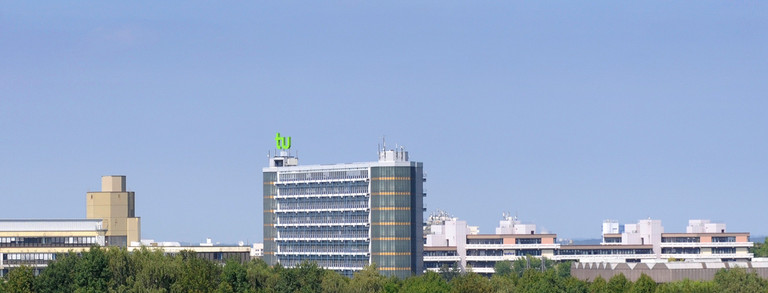Research Alliance Ruhr Receives a Further 48 Million Euros
- UA Ruhr
- Research Highlights
- Artificial Intelligence
- Top News
- Research
- Higher Education Policy
- Press Releases

On the TU Dortmund University campus, the Minister of Science met not only members of the Rectorate of the three UA Ruhr partner universities, but also five founding professors of the four Research Centers and the College for Social Sciences and Humanities, which are currently being established as part of the Research Alliance. Founded in 2021 at the initiative of the Ruhr Conference, up to 50 new professorships will be created here. After the initial appointments were successfully made this year, the full expansion is set to take place in the next two years. The Ministry of Culture and Science had already allocated 75 million euros to the UA Ruhr for the first three years of its development phase up to 2024.
Solutions for pressing future issues
Minister Ina Brandes said: “Excellent science requires excellent equipment and planning security. That’s why I’m delighted that we’re now making it possible for the Research Alliance Ruhr to expand this unique alliance of three universities in the Ruhr region with an additional 48 million euros. Within the network, the universities harness their potential even more effectively and make a valuable contribution to North Rhine-Westphalia as a scientific hub with international appeal. This is where solutions are developed for the pressing future issues facing people's everyday lives, such as energy supply, digitization and health care.”
Findings set to lead to innovations
Prof. Manfred Bayer, President of TU Dortmund University, who hosted the Minister's visit, expressly thanked the state for continuing to support top-level research in the Ruhr region despite budgetary constraints: “We are certain that these funds have been well invested to further strengthen the Ruhr area as a research and economic region,” he said. “With these funds, we are creating more than just new jobs in the scientific community – it’s also about arriving at scientific findings that will lead to innovations with the help of partners from the region.”

Prof. Barbara Albert from the University of Duisburg-Essen went on to emphasize: “Through this initiative, the universities continue to act as role models for cooperation in the Ruhr area. The Research Alliance Ruhr has further intensified the cooperation of the UA Ruhr, with interdisciplinary Research Centers now being systematically established across all three universities.” Prof. Martin Paul from Ruhr-Universität Bochum highlighted the added value generated for the region: “By pooling our expertise, we can succeed in further increasing the international visibility of science in the Ruhr area. When it comes to new appointments, our focus is on cooperating with scientific institutions from all over the world.”
The four Research Centers conduct research on pressing future issues in the areas of holistic health, sustainability, digitization and the Energiewende. For the humanities and social sciences, the College will also establish an open-topic forum for interdisciplinary dialog with international guest researchers. Each of these will be headed by one founding director: Prof. Dirk Schadendorf for the “Research Center One Health Ruhr”, Prof. Martina Havenith-Newen for the “Research Center Chemical Sciences and Sustainability”, Prof. Emmanuel Müller for the “Research Center Trustworthy Data Science and Security”, Prof. Alfred Ludwig for the “Research Center Future Energy Materials and Systems” and Prof. Julika Griem for the “College for Social Sciences and Humanities”.
Contact




![[Translate to English:] Partner Four hands are holding the green logo of TU Dortmund University](/storages/tu_website/_processed_/1/d/csm_Partner_Nicole_Rechmann_KW_670eba0154.jpg)




![[Translate to English:] Forschung An apparatus with tubes in a laboratory](/storages/tu_website/_processed_/0/c/csm_Forschung_Juergen_Huhn_4fa3153b51.jpg)
![[Translate to English:] Studium Five students are sitting in a lecture hall. They are talking to each other.](/storages/tu_website/_processed_/c/9/csm_Studium_FelixSchmale_dbdbfb0dd7.jpg)





